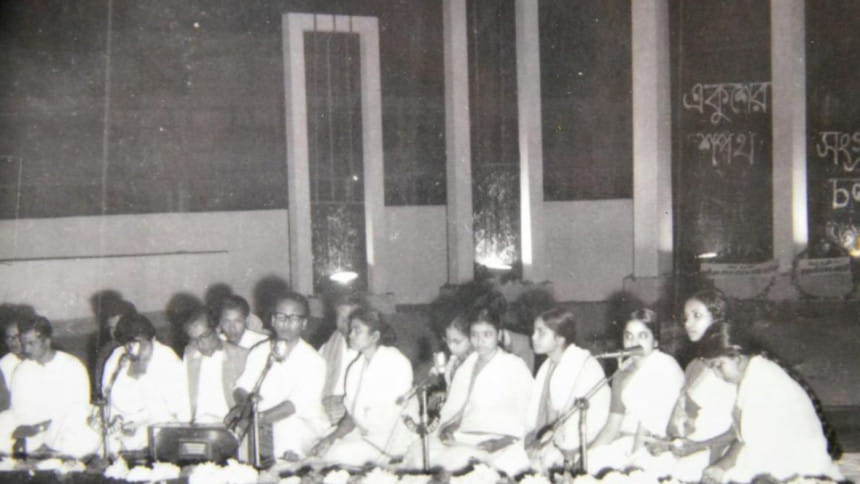The music that gave it grandeur

Sometime around the '60s, then president of Pakistan, Ayub Khan, was to visit the Dhaka radio station at Shahbagh. Massive preparations were underway to put up an impressive show. As the youngest group at the station, we were preparing for a live performance and were training under eminent composers Abdul Ahad, Samar Das and Abdul Latif.
The ever-buoyant Latif bhai would teach us patriotic, rhymes and spiritual songs as we would flock together at the big studio no. 6 at Shahbagh.
The spirited Latif bhai was a wizard when it came to children's songs. His on-stage performances never failed to captivate us. He sang as he spoke--with a booming voice, and in high spirits. His varied tunes always had a touch of the folk element. He was also a master in 'puthi paath,' the traditional art of reciting folklore--hardly heard nowadays.
He had the amazing ability to write lyrics and compose tunes at a moment's notice. The story goes that one of his timeless songs was written in a similar fashion. While on his way to office he had a sudden inspiration to write a song on the Language Movement. He hurriedly came back home. On a piece of paper, he scribbled the words, “Ora amaar mukher kotha kaira nitey chaye.” This was in the year 1952. The song was soon on everyone's lips, the message of the song forthright and strong.
The first song of Ekushey composed by Mosharrafuddin Ahmed on February 24, 1952, “Mrittuke jara tuchcho korilo bhasha bachabar torey”; Abdul Latif's “Ora amar mukher kotha kaira nitey chaye”, composed in 1952; “Bhulbona shei Ekushey February bhulbona” written spontaneously by Language Movement veteran Gaziul Haque in 1952; “Himalay thekey Sundarban hothath Bangladesh” by Sukanta Bhattacharya; “Phul khelbar din noi oddo” by Subash Mukhopadhyay and “Jonotar shongram cholbei” by Sikandar Abu Zafar were amongst the brilliant compositions by Sheikh Luthfur Rahman, which to our misfortune, are sadly by and large unheard nowadays.
The iconic Ekushey song, “Amar bhaiyer rokte rangano”, written by Abdul Gaffar Chowdhury, was initially set to music by Abdul Latif. Later, however, Altaf Mahmood's tune was adapted and the song became the popular number it remains to this day.
Ekushey itself is of course the culmination of a month-long programme. Artistes would gather, as they gather nowadays, at the altar every evening with poems, skits, drama and songs.
The call of history for us is simple. This nation needs to travel back to its heritage as exemplified by all those illustrious men, who instilled patriotism in us through the arts, injected vibrancy into our celebrations of the Ekushey spirit. Culture is all. A nation is everything with it, for culture lights up a path through the dense woods. Without culture, it is always primitivism which keeps individuals from flowering into purposeful societies.

 For all latest news, follow The Daily Star's Google News channel.
For all latest news, follow The Daily Star's Google News channel. 



Comments